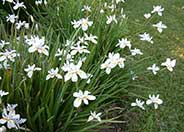
Common name:Butterfly-Iris, Fortnight Lily
Botanical name:Dietes iridioides
This clumping evergreen Iris bears tall, narrow leaves to 30" tall and white flowers marked purple in the center on stalks up to 3' tall. This variety has stiffer, darker foliage than the bicolor form. It requires sun to part shade with little or no summer watering when established.
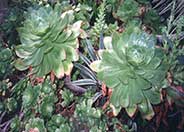
Common name:Aeonium cultivars
Botanical name:Aeonium cultivars
These plants are one of the most useful succulents, due to their decorative effects and sculpturesque quality. The branched stems hold a wide rosetta of either light green or purple leaves. The flowers appear in long, clustered form. They need some shade in hotter areas. Prostrate forms are low-growing, and spreading.
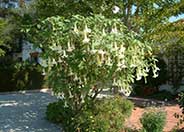
Common name:Angel's Trumpet, Datura
Botanical name:Brugmansia X candida
A tender, subtropical shrub that grows to 12', the Angel's Trumpet shows huge, felty leaves and enormous, pendant trumpet-shaped flowers. It has a sweet, heavy fragrance at night. It should be grown in sun to part shade, with average to little summer watering. The growth rate is faster with fertilizing, but it is more prone to insect damage. This variety seems to recover faster from hard frosts.
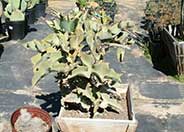
Common name:Felt Plant or Bush, Velvetleaf
Botanical name:Kalanchoe beharensis
This unusual succulent perennial will grow 4'-5' tall and wide. It has thick, fuzzy, gray green to golden leaves with inconspicuous flowers. Although tender to frost, it makes an excellent accent for rock gardens or desert themed landscapes.
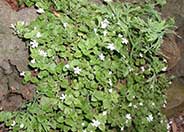
Common name:White Baccopa
Botanical name:Sutera cordata
White Baccopa is a prostrate ground cover with white flowers. It stays under 12" in height.

Common name:Fan Aloe
Botanical name:Aloe plicatilis
This wide succulent shrub grows 3'-6' tall and wide, with fan-like clusters of the bluish-gray round tipped leaves. From each fan emerges an open terminal cluster of tubular, orange red flowers in late winter to early spring. Plant in full sun if on the coast or in shade if inland. It is hardy to about 23 degrees F. It needs winter and spring irrigation if grown where does does not receive adequate water from rainfall.
Photographer: GardenSoft
Practice grass-cycling by leaving short grass clippings on lawns after mowing, so that nutrients and organic matter are returned to the soil.
Attract, or buy beneficial insects such as ladybugs and lacewings to control pest outbreaks in your garden.